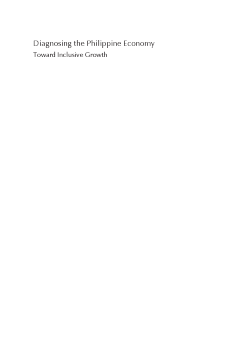
BOOK
Diagnosing the Philippine Economy
Dante B. Canlas | Muhammad Ehsan Khan | Juzhong Zhuang
(2011)
Additional Information
Book Details
Abstract
‘Diagnosing the Philippine Economy’ describes the conditions that depress economic growth in the Philippine economy and their causes and potential solutions. The studies’ findings provide insight for politicians, academicians, and economists into the issues and their potential solutions.
Based in Manila, Asian Development Bank is owned by 67 members, including 48 from the region. Its main instruments for helping its developing member countries are policy dialogue, loans, equity investments, guarantees, grants, and technical assistance.
Dante Canlas is the Enrique Virata Professor of Economics at the University of the Philippines and Editor of ‘The Philippine Review of Economics’. He is also the Chief Executive Officer for the Millennium Challenge Corporation's Philippine Program.
Muhammad Ehsan Khan is a Senior Economist at ADB’s Economics and Research Department (ERD) and has served as a Project Economist in ADB’s Southeast Asia Department.
Juzhong Zhuang is an Assistant Chief Economist at ADB’s Economics and Research Department (ERD).
'Recommended.' —J. S. Uppal, SUNY at Albany, 'Choice'
The pace of growth in the Philippines is slower than that of many neighbouring countries, and despite increasing growth in the period before the current global financial crisis, domestic investment remained weak, and had a declining share in gross domestic product. Understanding limits to growth in the Philippines’ economy and how they may be counteracted is crucial for policy makers seeking to encourage economic development.
‘Diagnosing the Philippine Economy’ investigates the binding constraints on economic development, by following a growth diagnostics approach. Articles within this collection cover the areas of macroeconomic management; trade, investments, and production; infrastructure, human capital; equity and the social sector; poverty reduction efforts; and governance and political institutions. The studies’ findings provide insight for politicians, academicians, and economists into the issues and their potential solutions.
